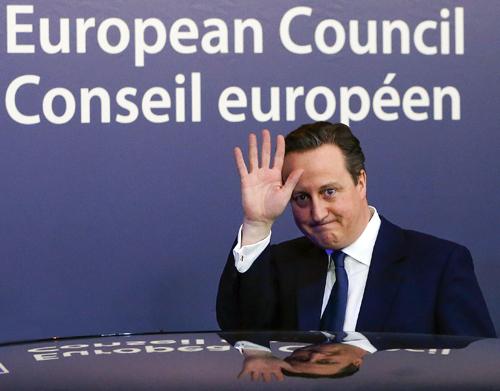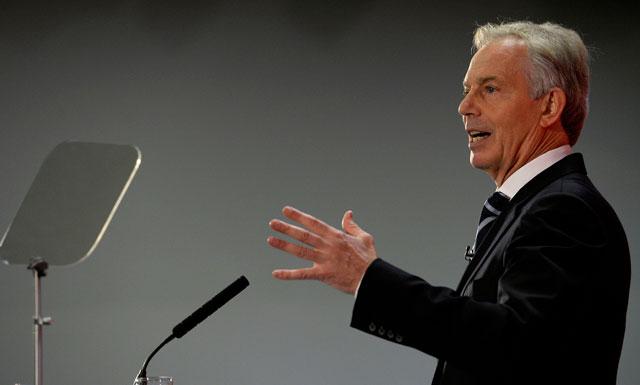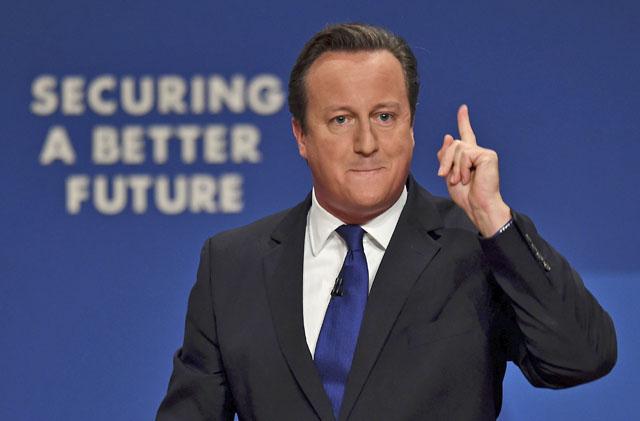You are here
Britain sets June date for historic EU referendum
By AFP - Feb 20,2016 - Last updated at Feb 20,2016

British Prime Minister David Cameron waves as he leaves a European Union leaders summit in Brussels, on Thursday (Reuters photo)
LONDON — Britain will vote on its membership of the European Union on June 23, Prime Minister David Cameron said Saturday as he began the daunting challenge of persuading the country to stay.
He announced the date for the referendum after a two-hour Cabinet meeting where he briefed ministers on the deal he struck in Brussels on Friday, that he said will give Britain "special status" in the EU.
"We are approaching one of the biggest decisions this country will face in our lifetimes," Cameron said, addressing the nation outside his 10 Downing Street residence.
"The choice goes to the kind of country we want to be," he said, warning that proponents of leaving were offering "a risk at a time of uncertainty, a leap in the dark".
Britain would be "safer, stronger and better off" in the 28-member bloc, he said, calling the concessions negotiated with other EU leaders "the best of both worlds".
The referendum campaign will be bitterly contested in a country with a long tradition of euroscepticism and a hostile right-wing press, with opinion polls showing Britons are almost evenly divided.
"The starting gun has been fired," the UK Independence Party (UKIP) said in a statement.
"The 23rd is our golden opportunity, let battle be joined," Nigel Farage, the party's leader, said, branding the EU deal "pathetic".
"We must look forward to work with everybody who cares about our future, a future where the people of Britain controls her own borders, where we can make our own trade deals and make our own laws.
"We want our country back," he said.
Cameron's Conservative Party in particular is split over Europe, and no sooner had Saturday's Cabinet meeting ended than five of its 22 ministers announced they would be campaigning to leave.
Among them are justice minister Michael Gove, who said "this chance may never come again in our lifetimes".
The biggest prize for the eurosceptic camp, which has so far been plagued by in-fighting and has no clear leader, would be Boris Johnson, the popular Conservative mayor of London.
Johnson, who has ambitions to succeed Cameron as leader of the Conservative party, has yet to declare his position.
'Let battle be joined'
Cameron announced his intention to hold a referendum three years ago, under pressure from Conservative eurosceptics and the rise of UKIP.
He said he would only campaign to stay in if he could secure reforms to address key concerns about EU migration, loss of sovereignty, economic competitiveness and the protection of non-eurozone Britain's financial sector.
Declaring success in his negotiations on Friday, with what German Chancellor Angela Merkel was a "fair compromise", Cameron said he would campaign "with all my heart and soul" to stay.
But critics say the deal, which contained restrictions on welfare payments for EU migrants and an opt-out for Britain from the EU's goal towards ever closer union, falls far short of what was originally promised.
"Call that a Deal, Dave?" headlined the mass-market Daily Mail, while The Daily Telegraph said Cameron had made "puny gains" and The Times called it "Thin Gruel".
'Depressingly negative campaign'
Analysts say the nitty gritty of the EU deal will likely be only a small part of the referendum campaign, which is already focused on the big issues of immigration, security, prosperity and Britain's place in the world.
"Voters are not going to decide by this deal," said John Springford, senior research fellow at the Centre for European Reform.
Opposition Labour leader Jeremy Corbyn dismissed Cameron's deal as a "sideshow" but said he would be campaign to stay because the EU "brings investment, jobs and protection for British workers and consumers".
Anand Menon, professor of European politics at King's College London, said he expected both sides to emphasise the risks of either leaving or sticking with the status quo.
"This is going to be a depressingly negative campaign," he told AFP.
The date for the referendum, which clashes with the Glastonbury music festival, an EU summit in Brussels and comes in the middle of the Euro 2016 football tournament, has to be approved in parliament and Cameron will address the House of Commons on Monday.
It will be Britain's second referendum on European membership in just over 40 years. In June 1975, voters backed membership of the then European Economic Community (EEC) by just over 67 per cent.
The question on June 23 will be: "Should the United Kingdom remain a member of the European Union or leave the European Union?"
Related Articles
Former prime minister Tony Blair plunged into Britain's general election fray on Tuesday, sounding a warning about the dangers of the country leaving the EU.
LONDON — Britain's prime minister appealed to doubters at home and in other EU capitals on Tuesday to back his attempt to reform the 28-memb
Prime Minister David Cameron promised to hand almost half the British population a tax cut if reelected next year, a pledge he hopes will win over millions of voters and refocus debate away from a schism inside his party over Europe.



















